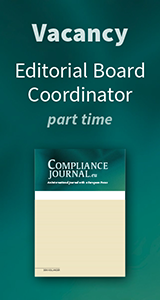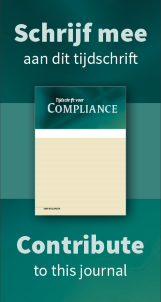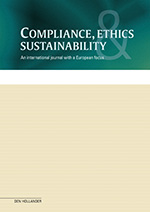Editorial
Het artikel is in de opmaak van het tijdschrift rechts als pdf beschikbaar.
Effective compliance training, as part of a compliance and ethics program, is considered crucial for organizations to foster ethical conduct, and mitigate risks. In this edition the authors and interviewees share practical experiences, as well as insights and theory from amongst others adult-learning principles and critical management studies, on, and related to, compliance and integrity training efforts. Team performance is emphasized. Other authors emphasize the need for personalized, engaging, and concise training modules that accommodate legal and cultural differences. In general, we will see that compliance training alone is, as such, not sufficient. Understanding the drivers of ethical behavior and cultivating a learning culture are equally important. To achieve sustainable success organizations should be cautious not to rely solely on training and should also design comprehensive processes and procedures and a healthy organizational culture. The edition also includes articles that address further forthcoming legislative requirements and a specific research-based article on the link between money laundering risks of the Dutch National Risk Assessment and drug trafficking.
The preview per article is written in the language of the article.
2. In this interview Dr. Kfir Manor explains what companies should concentrate on when designing effective training programs. He also shares insights gained during the research he conducted on the effect of legal environments on compliance programs (i.e. the level of regulation and enforcement), and the effectiveness of compliance programs within multinational organizations, for which he developed a model. He elaborates how he tested the hypothesis that heavily regulated industries would be more compliance-effective because they are much more subject to sanctions and how this correlates to compliance training and risk management.
3. Making it work: Effective Compliance Trainings
Zara Mathew & Nienke de Munck
Compliance trainings can be the business card of compliance, and are an essential element in a company’s compliance program. It is thus crucial to create trainings that generate optimal impact and are effective. In ‘Making it Work: Effective Compliance Trainings’, the authors present adult-learning principles that revamp the traditional format of code of conduct trainings. The authors argue that with theoretical and scientific principles as a basis, a training will have a (measurable) impact – that it will ‘work’. Next, the article provides an overview of metrics that can measure the impact of a code of conduct training, and thus the effectiveness. With the article, the authors hope to inspire organizations to continuously improve their training programs – leveraging new technologies to get better at what we do.
4. In this interview we spoke to Roland Notermans about common problems with compliance training and how to make training more effective. He shares tips and best practices and talks about trends in compliance training. Gone are the days of long training courses. Training should be short, engaging, applicable to the employee and should be a continuous dialogue with the leadership. Personalization is key, due to legal and cultural differences between countries. He also argues that business conduct should be part of a leadership program, as ultimately, the most important way to achieve compliance effectiveness is for leaders to explain and demonstrate daily that the company takes its core values and responsible business conduct seriously.
5. Compliance training, or training compliance?
Peter P. Westdijk
Based on Darwinian theory, the compliance officer that adapts best to changing circumstances has the highest chance to survive; survival of the fittest. This article explores a fitness program to train the compliance officer. The focus is on human interaction Employees from different generations, cultures, and professions could help the compliance officer to understand his audience and make his message more effective. The challenge for the compliance officer is to open up and broaden his focus to coach the organization to improve and comply. General human interaction is a great way of training skills that improve acceptance of the compliance officer’s message by the recipient.
6. Zonder dialoog geen compliance
Marlies de Vries en Femke de Vries
In dit artikel gaan de auteurs in op beperkingen van (exclusieve focus op) compliance training. Zij beargumenteren waarom het begrijpen waardoor (on-)ethisch gedrag wordt gestuurd een belangrijke voorwaarde is voor een lerende organisatie. Zij geven aan dat we ons niet moeten blindstaren op processen en procedures, en ook moeten oppassen om te veel vertrouwen te stellen in trainingen. Bij het invoeren van nieuw beleid of regels, of bij organisaties die medewerkers willen stimuleren om de (ethisch) juiste beslissingen te nemen, is de reflex vaak dat medewerkers zullen worden ‘opgeleid’. De veronderstelling is dan dat medewerkers met de juiste kennis over wat ‘hoort’ en wat niet hoort in staat én bereid zijn de juiste beslissingen te nemen. In dit artikel laten de auteurs zien dat opleiden en trainen weliswaar een belangrijke randvoorwaarde is voor ethisch gedrag in organisaties, maar tegelijkertijd niet een voldoende voorwaarde. Zij gaan achtereenvolgens in op de beperkingen van trainingen en op de grondoorzaken van gedrag in organisaties. Daarbij is hun boodschap dat wie ethisch gedrag in organisaties wil bevorderen, moet begrijpen waardoor gedrag in de eigen organisatie gestuurd wordt.
7. Critical Studies als uitdaging voor integriteit en compliance
Marcel Becker
De afgelopen decennia is het wetenschappelijk landschap verrijkt met een aantal critical studies. De eerste loot aan de stam betrof Critical Management Studies (CMS), die in de jaren ‘90 de organisatiewetenschap opschudden. Daarnaast ontstonden al snel nieuwe vormen die zich tot academische disciplines ontwikkelden: critical legal studies, critical race studies, critical data studies, critical accounting en fat studies. Zij hebben geleid tot felle discussies over de maatschappelijke inbedding van wetenschappen, en over de doorwerking van maatschappelijke normen en realiteit in wetenschappelijke activiteit. De op het oog meest relevante discipline voor het vraagstuk van integriteit en compliance is CMS. Een goede omgang met integriteitsdilemma’s is gebaat bij inzicht in de relatie tussen de thema’s die de critical studies agenderen en de gangbare integriteitsdiscussies. De auteur opent dan ook met het statement dat ontwikkelingen binnen het integriteitsdiscours ertoe hebben uitgenodigd dat thema’s van critical studies het discours binnensluipen. Vervolgens bespreekt hij twee wortels van de critical studies: marxisme en postmodernisme. Dit maakt uiteindelijk een kritische weging mogelijk van de bijdrage die critical studies kunnen leveren aan het integriteitsdebat. Aan het eind presenteert de auteur de deugdethiek als kader om met onvermijdelijke spanningen om te gaan.
8. A systemic approach to culture change
Jolien de Boer, Suzanne de Boer-Verheij, Marjan Houweling, Marlène Jans
A healthy organizational culture is one of the strongest drivers of an organization's success. However, many initiatives to change an organizational culture, to really embed the desired developments permanently in the organization, fail or in any case do not deliver the desired outcomes. Several pitfalls can result in failures or lack of effectiveness. Based on a team development approach that is already applied extensively in practice, the authors introduce a systemic approach at team level. This approach enables organizations to uncover hidden patterns and dynamics in the organization. And to consciously change these patterns incrementally for the better in case these patterns hamper an organization's success.
The specific for this purpose developed Team Performance Model is described and supported by visuals. The way to apply a systematic approach to teams is illustrated. This article provides compliance professionals with a new perspective for strengthening organizational culture.
9. De verdachte transacties van drugshandelaren: witwasrisico’s
Melvin Soudijn
Dit artikel geeft de lezer inzicht in de uitkomsten van een voor de eerste keer uitgevoerde kwantitatieve analyse van het Nederlandse Nationale Risk Assessment Witwassen (hierna NRA). Zowel het standpunt van de Algemene Rekenkamer (2022) als wel de beleidsagenda “Aanpak Witwassen” geven blijk dat de aanpak van geprioriteerde witwasrisico’s op basis van de NRA als maatstaf moet gelden. Soudijn kiest met betrekking tot de eerste kwantitatieve analyse voor het onderwerp drugsverdachten. Zijn reden voor deze keuze is dat wereldwijd veel aandacht gaat naar de bestrijding van witwassen om specifiek de drugshandel tegen te gaan. De door hem geformuleerde onderzoeksvraag is in hoeverre de door NRA benoemde witwasvormen te onderkennen zijn bij verdachte transacties van personen die mogelijk zijn betrokken bij drugshandel?
Ter voorbereiding van de analyse is hij gestart met het selecteren en bewerken van data afkomstig van (i) de Landelijke Eenheid Nationale Politie met betrekking tot het aantal verdachte personen in drugs gerelateerde gestarte opsporingsonderzoeken, en (ii) met betrekking tot verdachte personen uit verdachte transacties, vastgesteld door de FIU- Nederland op grond van de door Wwft-poortwachters gemelde ongebruikelijke transacties. Vervolgens is bepaald of, en in hoeverre, deze door FIU Nederland vastgestelde verdachte transacties terugkomen in één of meer van de 15 witwasvormen die de NRA heeft benoemd. De conclusie is dat 14 van de 15 witwasvormen bij de drugsverdachten kunnen worden onderkend. Alvorens tot deze conclusie te komen biedt de auteur een diepgaande beschrijving van, inzicht in en nuancering van zijn analyse. Hij sluit af met een drietal aandachtspunten die noodzakelijk zijn voor de eerder benoemde geprioriteerde aanpak van de witwasrisico’s op basis van de NRA.
10. CSRD reporting requirements place Compliance function in the spotlight
Rebecca Kozlowski, Serap Tutkun, Laura Schroder-van Oorschot
In this article the authors address the requirements of the Corporate Sustainability Reporting Directive (‘CSRD’). CSRD requires an estimated 50,000 companies in the European Union (‘EU’) to report on a wide range of Environmental, Social and Governance (‘ESG’) topics and puts the compliance function in the spotlight. Many companies may be unaware that their existing Compliance function activities may already address some of the CSRD requirements, such as Anti-Bribery and Corruption (‘ABAC’) training and risk culture. However, most companies will have gaps to resolve or may be struggling to determine their reporting information under CSRD. Those companies should look towards their compliance programs and integrated control frameworks as they can support in the transition.
11. Corporate Responsible Citizenship: Lessons from the Monaco Memo
Linda Schut and Karla Perez Aguilera
This article discusses how changing values and societal expectations, with respect to the impact that organizations have on society and the environment, is leading to increased corporate responsibility. Simultaneously, organizations are confronted with more and stricter legislation as well as with ever increasing enforcement by regulators, especially in the areas of corporate crime and environmental impact. How can organizations adapt to these changing values and expectations and become corporate responsible citizens? What do these developments mean for organizations and how does it impact the way they do business?
A crucial part in becoming a corporate responsible citizen is to have an effective compliance program. An effective compliance program not only ensures that an organization complies with laws and regulation, it also promotes ethical conduct and prevents corporate crime. Corporate responsible citizens recognize the value of a robust compliance program in fostering ethical decision-making, protecting the organization, and guiding it through times of crisis. How can organizations design an effective compliance program? This article discusses key elements of an effective compliance program using the guidance included in a memorandum of the US Department of Justice’s as well as updated legislation.
12. Tot slot de boekenkast van Edgar Karssing. Karssing gaat in op het boek Moral imagination and management decision-making waarin Smith-kenner Patricia Werhane het belang van morele verbeeldingskracht revitaliseert voor de bedrijfsethiek. Werhane was op zoek naar frisse inzichten om te begrijpen waarom fatsoenlijke managers soms zeer kwestieus handelen, waarom succesvolle bedrijven geen oog hebben voor ethiek. Was hier sprake van hebzucht, van morele onvolwassenheid, van tekortschietend moreel redeneren? Soms wel, stelt Werhane, maar een minstens zo belangrijke verklaring voor immoraliteit is een gebrek aan morele verbeeldingskracht. En omgekeerd, vele ‘good practices’ zijn juist te verklaren doordat managers met heel veel morele verbeeldingskracht een lastige situatie hebben aangepakt. Het boek van Werhane is uit 1999, sindsdien hebben vele anderen het onderwerp opgepakt en er ook empirisch onderzoek naar gedaan: wat levert het op, hoe kun je het ontwikkelen, hoe kan een context morele verbeeldingskracht stimuleren of juist frustreren? In paragraaf 2 werkt de auteur verder uit wat morele verbeeldingskracht is en doet, wat het oplevert en waarom dat belangrijk is. In paragraaf 3 noemt hij een aantal manieren waarop morele verbeeldingskracht kan worden versterkt. Hij rondt af met enkele mijmeringen over morele verbeeldingskracht als noodzakelijke maar niet voldoende voorwaarde voor een zorgvuldige belangenafweging.
On behalf of the editorial board we hope you enjoy this edition!
Karen Fluks, Claudia Sijstermans, Marlon Straathof en Bartheke Weerstra




